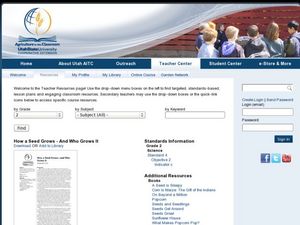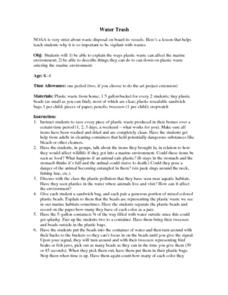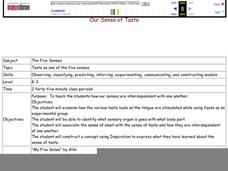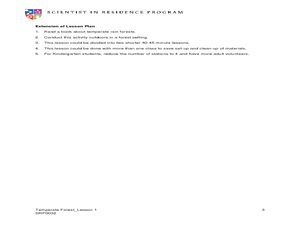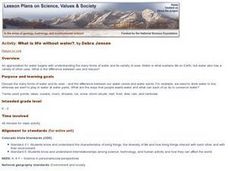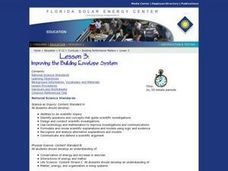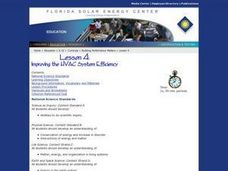Curated OER
How a Seed Grows and Who Grows It
First graders explore biology by viewing PowerPoint presentations in class. In this plant life instructional activity, 1st graders identify the life cycle of a plant and how to properly plant a seed outside. Students view a movie about...
Curated OER
Where Do Your Veggies Grow?
First graders investigate the origins of vegetables. In this Science lesson, 1st graders identify where fruits and vegetables come from. Students describe how people utilize plants.
Curated OER
Dinosaurs 1: Where Are the Dinosaurs?
Students explore dinosaurs. In this dinosaur identification lesson, students watch video clips for different dinosaurs from the Discovery Kids website. Students discuss the clips with their teacher. Students may then role play the...
Curated OER
A Rainbow Under the Sea: How Do Animals Survive in the Ocean?
Second graders, with adult help, create a PowerPoint presentation on a selected ocean animal.
Curated OER
Oceanography Research
Fifth graders locate information on a specific ocean animal using encyclopedias, nonfiction books, SIRS Discoverer, multimedia encyclopedias, and the Internet. They create an acrostic poem about the ocean animal they have been researching.
Curated OER
Sugar Bush Sap Production - Human Environmental Impact on Sap Sand
Eleventh graders compare the amount of sugar sand present in tree sap. In this environmental science lesson, 11th graders measure different tree circumference. They prepare a report and share findings in class.
Curated OER
Water Trash
Learners explain the ways plastic waste can affect the marine environment. They are able to describe things they can do to can down on plastic waste entering the marine environment.
Curated OER
Biosphere
Students examine the basic biosphere and its components. In this ecology instructional activity students complete several experiments including designing a system that is balanced to sustain life.
Curated OER
Collecting Plankton
For this science worksheet, students learn facts about plankton by reading two pages of factual information. Students read about the different kinds of plankton and how it is classified. Detailed drawings are included. There are no...
Curated OER
Bivalve Biology
Young scholars place clams into a beaker containing saltwater. They place a small drop of food coloring just above the shell. Students observe the movement of the food coloring. Clams are then placed into clean beakers of saltwater with...
Curated OER
Convening, Creating, and Conventioneering
Students study coelenterates. In this science lesson, students author a story regarding the life cycle of coelenterates following an in depth study of the creatures.
Curated OER
Biodiversity
Students complete activities to study the importance of biodiversity. For this biodiversity lesson, students find images to categorize into organism groups and illustrate their interconnections. Students use measurement tools to study a...
Curated OER
Adaptations
Students identify what adaptation is and to research a specific mollusk. They also identify and interpret how animals get their common and scientific name and why it is Latin. Finally, students draw their shell (mollusk) and name their...
Curated OER
Vermicomposting
Fourth graders explore insect life by viewing a soil presentation in class. In this composting lesson, 4th graders read assigned text about the process of composting soil and the necessity of soil in plant life. Students view video clips...
Curated OER
Our Sense of Taste
Students explore the relationship between the senses of taste and smell using a blindfold taste test. In partners, they taste different foods with their noses plugged and unplugged. They create a life size outline of the human body to...
Curated OER
Bird Bodies
Students read about and explore the different types of birds. They discuss how all birds are alike and what makes some different from the others. They experiment picking up "food items" using different tools that represent different...
Curated OER
Exploring Forest Objects
Students explore the forest. In this ecosystems activity, students rotate through sensory activity centers, brainstorm, and read about temperate forests.
Curated OER
What is Life Without Water?
Learners differentiate between how they use water in response to a need and how they use water for pleasure. They read books about water, participate in class discussion and illustrate their observations.
Curated OER
Science: Down Home Dinosaurs
young scholars participate in hands-on activities to discover the different types of fossils. Using teacher-provided materials, they make models of cast and trace fossils. After writing essays describing how traces are formed, students...
Curated OER
Exploring Texture In the Garden
Students explore the garden environment. In this garden environment lesson, students investigate the needs and parts of a plant. Students discover the differences between fruits and vegetables while creating their own garden.
Curated OER
Improving the Building Envelope System
Students explain the different heat transfer mechanisms and how they influence the building envelope. They develop ways in which the building envelope can be improved and test hypotheses about building envelope designs.
Curated OER
Improving the HVAC System
Students describe the components of an HVAC system and determine which factors influence how efficient the system can be. They work together to develop hypotheses about the systems and their cost effectiveness and efficiency.
Curated OER
The Envelope System: A Partial Solution
Studnet identify examples of conduction, convection and radiation. They develop an example of a building envelope. They also describe how heat transfer mechanisms can affect home energy costs.
Curated OER
Using Primary Sources: Letters from the Presidents
Learners find out about the minds and thoughts of presidents through reading their actual letters. They explore the personal lives of presidents. They answer questions about a primary source. They write essays.


